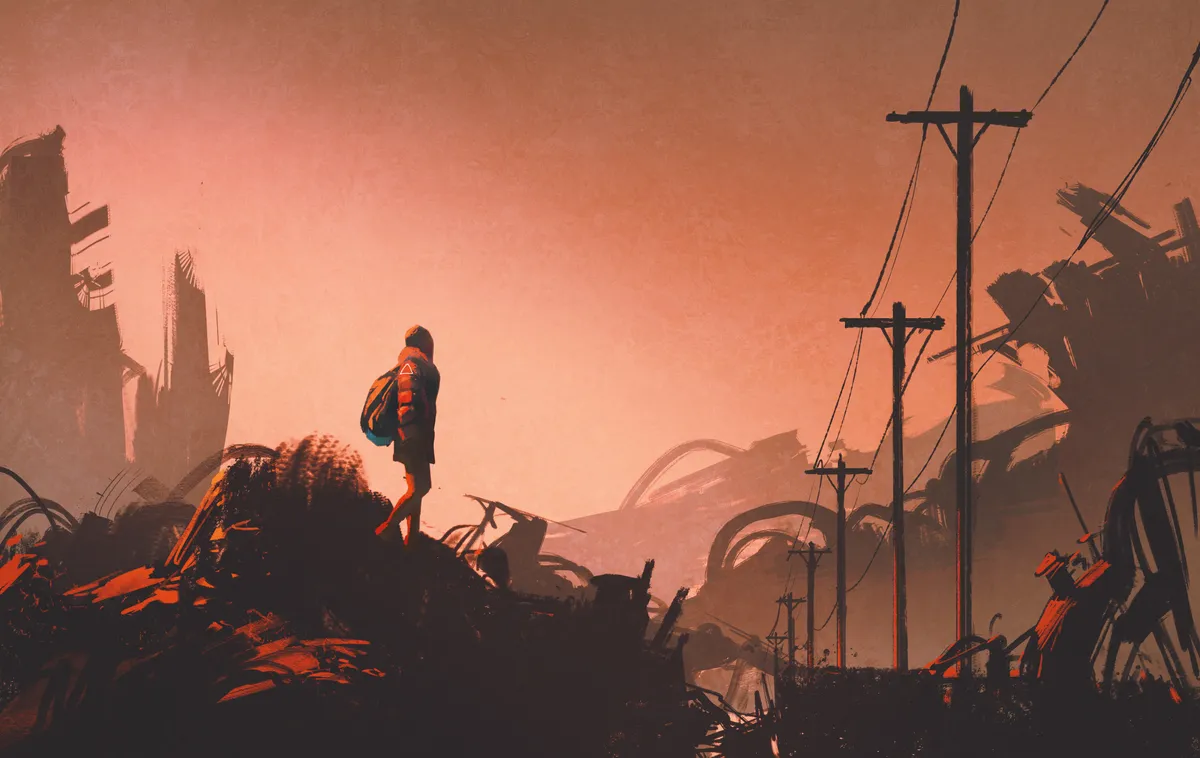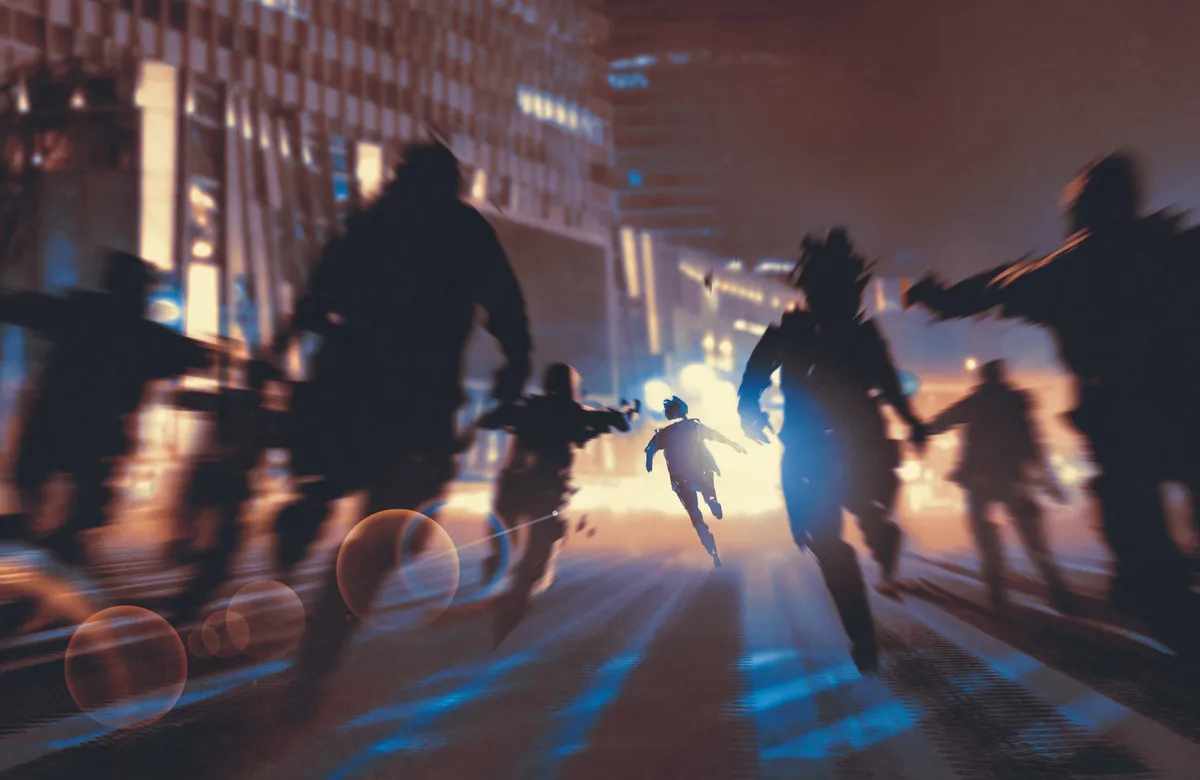The zombie apocalypse might sound like a great opportunity to wipe your debts and catch up on your reading but if The Walking Dead has taught us anything, it’s that surviving in an undead wasteland is not easy. As the show enters its eleventh and final season, we talk to survival experts and professional preppers about what it gets right and wrong, along with their own tips for surviving a doomsday scenario. After all, after the last couple of years, a zombie apocalypse doesn’t sound quite as far-fetched as it used to.
Stay at home, again
John Ramey, founder of survivalist company The Prepared doesn’t recommend sinking your money into a bunker. “Instead of thinking about things like bunkers,” he says. “We should be focused on hardening our existing homes and communities and making them more resilient, with doors that take more than one kick to bring down. Your home is your castle. It’s the best place to ride out any emergency.”
Hence why he encourages people to think about how long they can shelter in their homes. “If you had to lock yourself in your home right now, no gas, no water, no electricity or communication, how long and how well can you do that?” he says. “The baseline should be two weeks, because that covers most emergencies like natural disasters. Some people go further in their prepping and can last six months. I'm at the point where I can survive indefinitely. I have an indefinite ability to create food and find and treat water and so on.”

Supplies
Fail to prepare and prepare to be eaten alive, screaming. According to Ramey, you should be well stocked with basic supplies. “Think Maslow’s hierarchy of needs – food, water, health, communication,” he says. “You need first aid supplies. Hygiene supplies: can you wipe your pits and poop? A big example is water storage. The rule of thumb is a gallon of water per person per day. So if you have three people in your household for two weeks that would be 45 gallons.
"Long-term, do you have the ability to capture and store water? And then the treatment products that come with them. Do you have a water filter or reverse osmosis system, maybe a UV purifier? You need some ability to take wild water and make it safe to drink.”
You should also have what the prepping community refer to as a ‘bug out bag’, a bag of basic supplies that you can grab when you need to leave the safety of your home. Cameron Carlson, survival expert and member of the Zombie Research Society, has a shopping list: “A lighter or waterproof matches, an emergency blanket, a sleeping bag, freeze dried food, a flashlight, batteries, a solar radio, a water purifier, a camping stove, a knife, a gun (if you're able to have one), a medical kit.A tarp which would help build shelter, if needed.
"A good tip is to pack AAAAA steel wool (the really fine stuff) and a 9-volt battery. You can easily start a fire by touching the steel wool with the battery and the steel wool can compress to fit a lot into a very small place.”
Ramey also recommends investing in a bike. “The bicycle is the classic bug-out vehicle,” he says. “It's the most efficient human machine ever created. Whenever professionals watch The Walking Dead one of the groaners is that it's eight years later and people are still driving gasoline vehicles. Gas expires in about six months. You can add additives to it and extend that life but the idea that after six to twelve months of society falling that you're going to find usable gasoline is laughable.”
Skills
It doesn’t matter how many supplies you have, however, if you do not have the skills to use them.
“The big one is first aid and a core medical understanding of how to clean and dress wound,” says Ramey. “If Daryl from The Walking Dead gets hit in the shoulder with a crossbow bolt, how are you going to be able to handle it? Modern society is great, but we've lost thousands of years worth of hard-fought survival knowledge in the last hundred years.
"Many of our grandparents would have at least had some basic knowledge of how to handle a wound. Even if you take a standard first aid course, they teach on the assumption that you can pick up the phone and a hero will show up seven minutes later with drugs and electricity.”
Outdoor survival skills are also essential. “Similarly,” adds Ramey, “People don't know how to navigate anymore. There's now a thing in the search and rescue community called Death by GPS. So, do you know how to read a map? Do you know how to start a fire? Do you know how to create a winter shelter so you won’t die from exposure?
"A less obvious example is conflict resolution and situational awareness. Are you paying attention to what’s around you? Do you know how to diffuse tense situations without resorting to violence?”

Where to go
At some point, you may be forced to leave the house and seek shelter elsewhere. But where should you go?
“If you live in New York City or London and the zombie apocalypse happens, you probably need to get to the country to get away from people,” says Ramey. “But even in a zombie apocalypse, that desire to be alone could change. Because as we see in The Walking Dead, at some point you're going to need community. Community wins 99 per cent of the time compared to this kind of lone wolf imagery of walking alone into the sunset, with your dog by your side and a shotgun over your shoulder.”
The idea of humanity tearing itself apart after a post-apocalyptic event is a popular one, but Michał Zalewski, author of Practical Doomsday: A User's Guide to the End of the World, doesn’t buy it.
“I think most people would rather quietly suffer than harm an innocent person,” he says. “A more profound risk is that in the times of uncertainty and fear, we tend to lash out against out-groups. But in the zombie scenario specifically, we already have a clear enemy. I think that would bring us closer together, not drive us apart.
"And more prosaically, we're not machines: we can get ill, we need to sleep, we can't learn all the skills conceivably needed to get through every possible calamity. Being on good terms with a doctor or a plumber can save the day.”
Zombies
But what about the zombies themselves? According to zombie expert Cameron Carlson, it depends on whether they are the rabid kind that run like wild animals (think 28 Days Later) or the slow, shuffling The Walking Dead variety.
“If they are fast, I know I am not out-running them,” he says. “So you have to turn to stealth. Move in the shadows, underground, any way to avoid them. If you get into a confrontation with a fast-mover, you know where there is one there is more. Unless you have multiple people in your group who know how to use weapons tactically and proficiently, you're done. As for the slow ones, just move around them.”
Carlson also recommends making use of dogs, who can sense threats or major changes. “Dogs have a very keen sense of smell, much more than you or I,” he says. “They would be a good warning device. Watch the dogs, if they begin to act strange, growl, show their teeth, or pace a lot, something is wrong. They could give you an early warning.”
An intriguing difference between the UK and the US, of course, are the two countries’ approach to gun ownership. How would this affect the outcome of trying to survive a zombie apocalypse?
“There’s good and bad,” says Ramey. “If I'm at my home and the zombies are trying to get in to eat my face, then my last line of defence is a shotgun in my hand. In that regard, American gun culture provides a benefit.
"But that also then can create a negative because if society is falling apart and people are panicking, those people are going to be armed. And you know, we've certainly seen over the last two years that even in a mild emergency about a third of society is going to lose their minds and be horrible to deal with. So, blessings and curses.”
About our experts
John Ramey is the founder of The Prepared, a survivalist company. With a background in Silicon Valley, he has advised the US government and Department of Defense on emergency technology economic decline.
Cameron Carlson is the spokesperson for the Zombie Research Society. He is an active duty officer in the United States Navy. He has conducted counter-piracy operations in the Gulf of Aden, researched disaster relief effectiveness around the world, and is an expert in outdoor survival.
Michał Zalewski is a computer security expert and author of Practical Doomsday: A User’s Guide to the End of the World.
Read more about zombies: